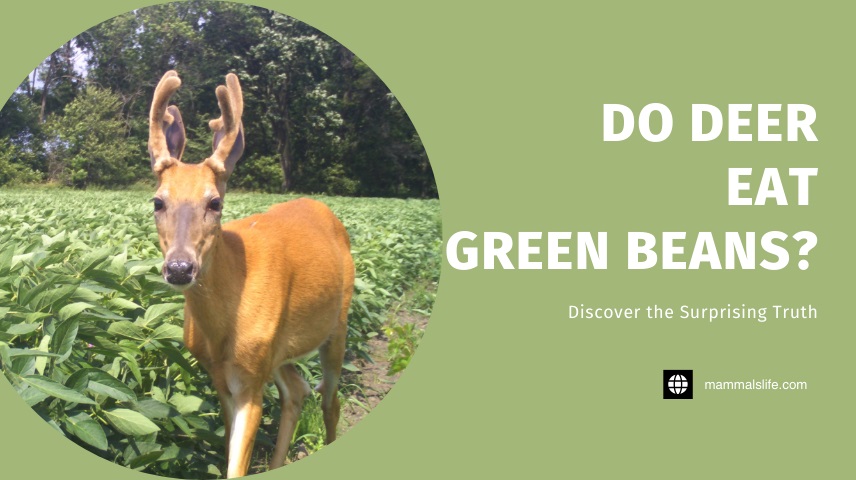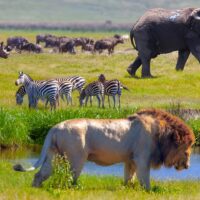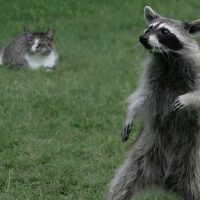Last Updated on February 22, 2025 by Mammals Life
Yes, deer eat green beans. They find them tasty and often raid gardens for them.
Green beans are a common target for deer, especially in home gardens. These animals are herbivores and have a diverse diet that includes various plants and vegetables. Green beans provide essential nutrients, making them an attractive option. Gardeners often struggle to protect their crops from these persistent animals.
Deer can easily strip a plant of its beans, causing significant damage. To prevent this, many gardeners use fencing, repellents, or plant deer-resistant varieties. Understanding deer behavior and their dietary preferences can help in safeguarding your garden. If you live in an area with a high deer population, taking these precautions becomes even more critical.
Introduction To Deer Diet
Deer are fascinating creatures with diverse eating habits. Understanding what deer eat helps us coexist with them better. Knowing their diet can also help gardeners protect their plants.
Common Foods Deer Eat
Deer consume a wide variety of foods. Their diet includes:
- Grasses
- Woody plants
- Fruits
- Nuts
- Vegetables
They have a particular fondness for tender leaves and young shoots. These foods are easy for them to digest.
Seasonal Dietary Changes
Deer adjust their diet based on the season. This helps them survive all year round.
| Season | Primary Food Sources |
|---|---|
| Spring | New leaves, flowers, and grasses |
| Summer | Fruits, vegetables, and leafy plants |
| Fall | Nuts, acorns, and grains |
| Winter | Bark, twigs, and evergreen plants |
In spring, deer feed on new leaves and flowers. During summer, they enjoy fruits and vegetables. Fall brings nuts and grains into their diet. In winter, they rely on bark and twigs.
Green Beans In Deer Diet
Deer often wander into gardens looking for food. Green beans are a common target. They are easy for deer to eat. In this section, we will explore why deer eat green beans.
Nutritional Value Of Green Beans
Green beans are rich in nutrients. They offer vitamins and minerals. Here are some key nutrients found in green beans:
- Vitamin C: Boosts the immune system.
- Vitamin K: Helps with blood clotting.
- Fiber: Aids in digestion.
- Protein: Supports muscle growth.
These nutrients make green beans appealing to deer. They help deer stay healthy.
Deer Attraction To Green Beans
Deer find green beans tasty. Their smell and texture attract deer. Deer also prefer young, tender beans. Here is a table showing what attracts deer to green beans:
| Attribute | Reason for Attraction |
|---|---|
| Smell | Green beans have a fresh scent. |
| Texture | They are easy to chew. |
| Tenderness | Young beans are soft and tasty. |
These factors make green beans a favorite snack for deer. Gardeners often find their green beans eaten. To protect gardens, many use fences or repellents.
Evidence Of Deer Eating Green Beans
Many gardeners wonder if deer eat green beans. There is plenty of evidence that suggests they do. This evidence comes from both scientific studies and anecdotal observations.
Scientific Studies
Research supports the idea that deer eat green beans. Many studies have focused on the diet of deer. These studies have shown that deer enjoy a variety of plants. Green beans are no exception.
For example, a study published by the Journal of Wildlife Management found that deer often eat green beans. The study observed deer in several regions. In each region, deer were seen eating green beans from gardens.
| Study | Findings |
|---|---|
| Journal of Wildlife Management | Deer frequently ate green beans |
| Wildlife Society Bulletin | Green beans are a preferred food source |
Anecdotal Observations
Many gardeners report seeing deer eat green beans. These stories are common in areas where deer are prevalent. Gardeners often notice the damage to their green bean plants.
- One gardener in Ohio saw deer eating his green beans nightly.
- Another in Virginia lost an entire crop to deer.
These observations show that deer find green beans tasty. They often return to gardens for more.
Both scientific studies and anecdotal evidence show that deer eat green beans. Gardeners should take steps to protect their crops from hungry deer.
Impact On Gardens And Farms
Deer can cause serious harm to gardens and farms. They love green beans. Understanding their impact is important for protecting crops. Here, we discuss the damage they cause and ways to prevent it.
Damage To Crops
Deer enjoy eating green beans. They often visit gardens and farms for this tasty treat. This can lead to significant crop loss. Farmers and gardeners may find their hard work ruined overnight.
Deer not only eat green beans but also trample plants. This can damage other crops and soil. The impact can be widespread, affecting overall farm productivity.
| Type of Damage | Description |
|---|---|
| Eating Crops | Deer eat green beans and other plants, reducing yield. |
| Trampling | Deer trample plants and compact soil, harming growth. |
Preventive Measures
Protecting gardens and farms from deer is essential. Here are some effective measures:
- Fencing: Install high fences to keep deer out. Fences should be at least 8 feet tall.
- Repellents: Use deer repellents around your crops. These can be chemical or natural solutions.
- Netting: Cover plants with netting to prevent deer access.
- Scare Devices: Use scare devices like motion-activated sprinklers. These can frighten deer away.
Implementing these measures can help protect your crops. This ensures your hard work does not go to waste.
Natural Alternatives For Deer
Deer love munching on garden plants, especially green beans. Finding natural alternatives for deer can help deter them from your garden. These alternatives provide food sources and habitat for deer while protecting your crops.
Native Plants
Native plants are a great choice for deer. They are well-suited to the local environment and require less maintenance.
- Wildflowers: Deer love wildflowers like milkweed and goldenrod.
- Grasses: Plant native grasses such as switchgrass and bluestem.
- Bushes: Native shrubs like elderberry and sumac attract deer.
These plants not only provide food but also offer shelter for deer. Native plants also support local wildlife and pollinators.
Preferred Food Sources
Deer have specific food preferences. Offering these can keep them away from your garden.
| Preferred Food | Details |
|---|---|
| Acorns | Deer love acorns from oak trees. |
| Fruits | Apples, pears, and berries are deer favorites. |
| Nuts | Deer enjoy nuts like chestnuts and hickory nuts. |
Providing these preferred foods can divert deer from your green beans. Planting fruit trees and nut-bearing trees can help.
Frequently Asked Questions
Do Deer Eat Green Beans In Gardens?
Yes, deer love eating green beans. They often raid gardens for them.
How To Protect Green Beans From Deer?
Use fencing, deer repellents, or motion-activated sprinklers to protect green beans.
Are Green Beans Harmful To Deer?
No, green beans are not harmful. They are safe for deer to eat.
What Other Vegetables Do Deer Eat?
Deer also eat tomatoes, carrots, and lettuce. They enjoy a variety of garden vegetables.
Conclusion
Deer do eat green beans, often raiding gardens for this tasty treat. Protect your crops with fencing or deterrents. Knowing their diet helps in planning your garden layout. Use these strategies to enjoy a deer-free vegetable garden. Share your experiences and tips in the comments below.








